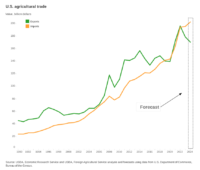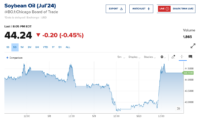Bloomberg's Clarice Couto reported this past Friday that "a surprising tax change in agriculture powerhouse Brazil has the potential to make soy grown in the world’s largest bean exporter less…
President Trump Signs the USMCA
New York Times writers Ana Swanson and Emily Cochrane reported on Wednesday that, “President Trump signed the revised North American Free Trade Agreement into law on Wednesday, fulfilling a key campaign promise and bringing more than two years of tumultuous negotiations over the continent’s trade rules to a close.
“The trade deal, now called the United States-Mexico-Canada Agreement, updates the quarter-century-old NAFTA, with stronger protections for workers and the digital economy, expanded markets for American farmers and new rules to encourage auto manufacturing in North America.”
President Trump signs #USMCA Trade Agreement into law.
— CSPAN (@cspan) January 29, 2020
Full video here: https://t.co/rIYosB3QjW pic.twitter.com/nBWABmZUQh
Recall that in December, after gaining the support of Democratic lawmakers in Congress, the House passed the revised North American trade pact by a vote of 385 to 41.
In early January, the Senate Finance Committee passed the USMCA by a vote of 25-3, and the full Senate voted 89-10 in support of the measure on January 16th, one day after the U.S. and China signed a Phase One trade deal.
Headed into the @WhiteHouse to join President @realDonaldTrump for #USMCA signing. Great to see @USTradeRep’s Chief Agricultural Negotiator Gregg Doud! He continues to be a strong voice for Illinois farmers. #PromisesKept pic.twitter.com/cZ2e7ckGyO
— Darin LaHood (@RepLaHood) January 29, 2020
In a separate Times’ article on Wednesday, Ana Swanson and Jim Tankersley explained that, “The agreement gives American farmers some additional access to foreign markets, particularly in Canada.
It does not dismantle Canada’s ‘supply management system,’ which dictates how much Canadian farmers should produce so they can be profitable. But Canada did agree to eliminate a program that helps sellers of certain milk products, at home and abroad, and open its market to American milk, cream, butter, cheese and other products.
“In return, the United States expanded access to its market for Canadian dairy and sugar.
“It also creates a list of cheese names that Mexico and the United States agree can be marketed without restriction in their countries, and it forces grocery stores in British Columbia to stop their practice of selling British Columbia-only wines on certain shelves, and stock American wines alongside them.”
.@RepHagedorn and I serve on the @HouseAgGOP and we’re looking forward to @POTUS to signing the #USMCA. This is a big deal for Illinois farmers! pic.twitter.com/y2LwXmHRqx
— US Rep Rodney Davis (@RodneyDavis) January 29, 2020
Bloomberg writers Justin Sink and Jordan Fabian reported on Wednesday that, “The new trade provisions are projected to add about 0.35% to the economy after six years. But the accord’s passage has had a more immediate effect on investors, easing concerns that Trump could disrupt the economy by pulling out of Nafta without a new deal in place.”
“Later Thursday, the president will head to Iowa before that state’s first-in-the-nation presidential caucuses. He is expected to tout the trade deal’s benefits for farmers in the region,” the Bloomberg article said.
Meanwhile, Wall Street Journal writer Paul Vieira reported this week that, “Canada’s Liberal government on Monday began the task of ratifying the revised North American trade deal, a process that could take months and force Prime Minister Justin Trudeau into some deal making with rivals to ensure quick passage.
“Canada is the last country remaining to yet ratify the revised trade deal, following the conclusion of talks between the Trump administration and the Democratic-controlled House of Representatives.”
And that’s it - President Trump signs off on #USMCA.
— Richard Madan (@RichardMadan) January 29, 2020
Over to you, Canada ... #cdnpoli pic.twitter.com/8V2Tr9sxK2
The Journal article stated that, “The pact won’t come into force until 90 days after the last country ratifies the deal. The timing of Canadian approval remains a wild card as the governing Liberals try to navigate a minority government, which gives the opposition parties—which have criticized elements of the deal—some leverage.
“Any perceived foot dragging could fuel unease and unrest from the Trump administration and perhaps even Mexico, as both are eager to move on and put their focus elsewhere, trade watchers say.

“‘This won’t be a rubber stamp,’ said Mark Warner, a trade lawyer who practices in Toronto and New York and has closely followed the USMCA talks. ‘It will get passed but there will be bumps.’







